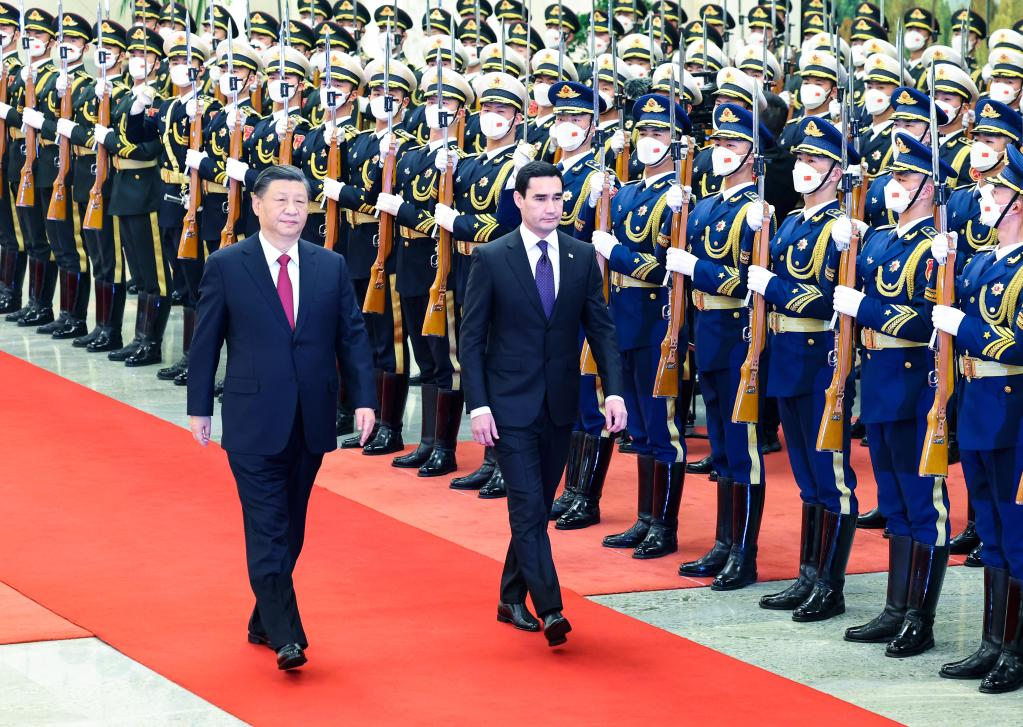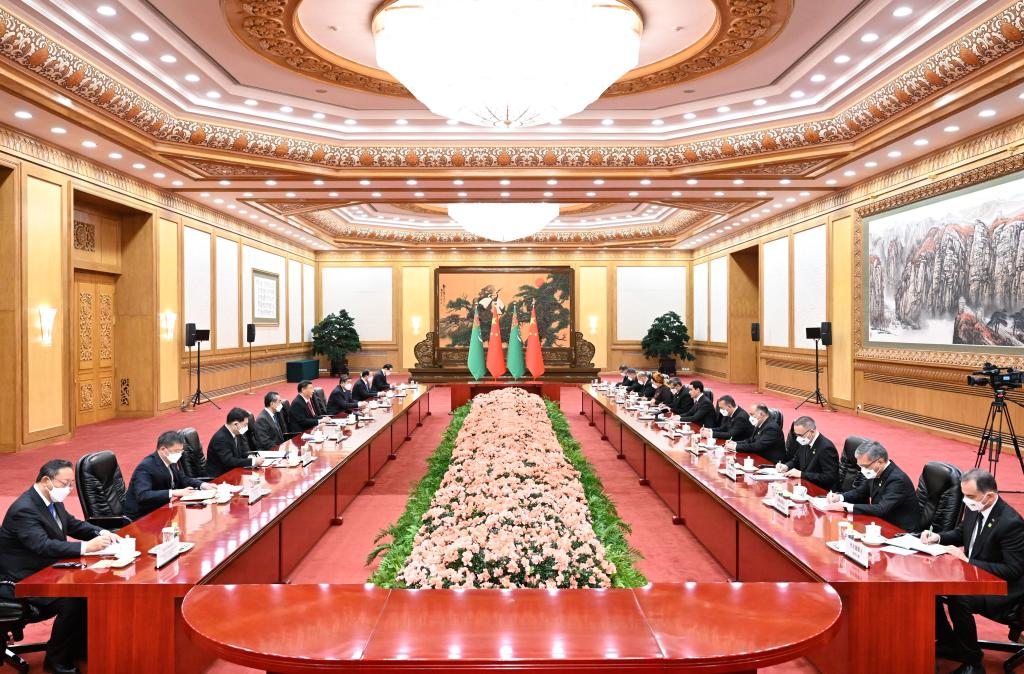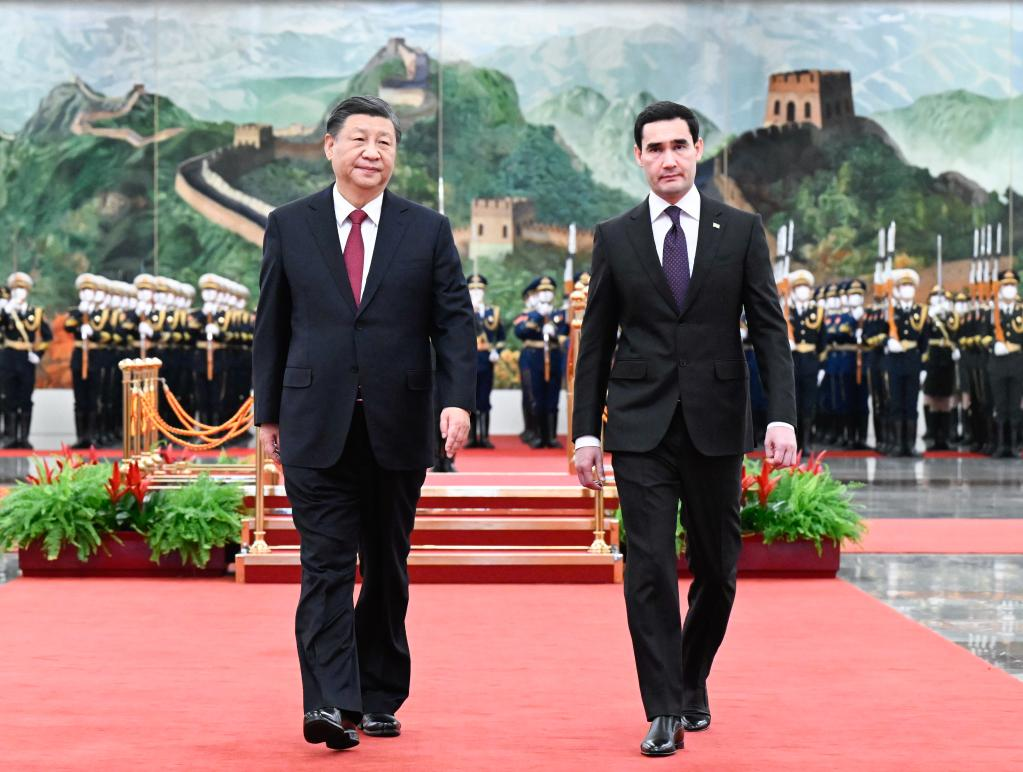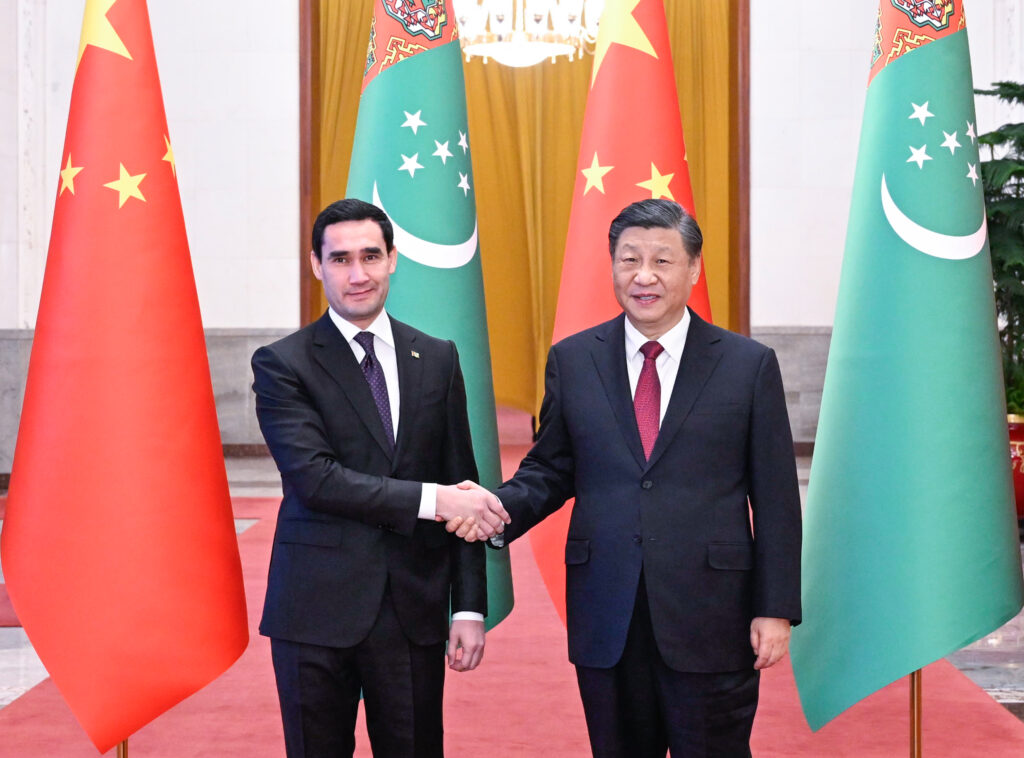Xi calls for expanding breadth, depth of cooperation with energy as cornerstone
The elevation marks a new milestone in bilateral relations, fully demonstrating the long tradition of friendship and both sides’ high hopes for its future development, observers said.
From the joint statement issued after the top leaders’ meeting, observers saw great momentum for the two countries to diversify and deepen cooperation beyond energy, innovate communication and cooperation mechanisms and jointly safeguard regional peace, stability and development.
Prior to the two leaders’ talks at the Great Hall of the People, 21 cannon shots were fired at Tian’anmen Square as a salute to welcome Serdar Berdimuhamedov, according to the Xinhua News Agency.
Xi emphasized that the two sides should support each other on issues concerning their core interests and respect each other’s pursuit of a development path suited to their own national conditions. It is important for the two countries to synergize their development strategies at a faster pace, make full use of such mechanisms as the China-Turkmenistan Cooperation Committee, and continue to expand the breadth and depth of cooperation, in order to create underpinnings for bilateral relations with tangible cooperation outcomes.
In the face of new circumstances and new challenges in the international and regional landscapes, the two sides should deepen cooperation on law enforcement, security and bio-security, and jointly crack down on the three forces of terrorism, separatism and extremism, to build strong security shields for the development of both countries, Xi said.
President Berdimuhamedov expressed great pleasure at making his first state visit to China on this historic day, which marks the 31st anniversary of diplomatic relations between Turkmenistan and China.
Noting the fruitful exchanges and cooperation that the two sides have achieved, Berdimuhamedov said Turkmenistan firmly supports China in safeguarding national sovereignty and territorial integrity, and resolutely opposes any attempt to split China.
Zhu Yongbiao, executive director of the Research Center for the Belt and Road at Lanzhou University, told the Global Times on Friday that elevating the bilateral relationship is a natural step based on traditional friendship and promising progress in cooperation. The two presidents have charted a clear course for the future and many concrete aspects of cooperation are expected to flourish as a result.
Security cooperation is an indicator of high-level mutual trust. Zhu, commenting on the issue of security, believes that China and Turkmenistan have expanded consensus on related topics, as a stable and peaceful central Asia is in line with both countries’ interests.
The prolonged Russia-Ukraine conflict, the security situation in Afghanistan, the “three evil forces” which President Xi noted, as well as non-traditional security issues are topics of common concern, Zhu said.
Analysts also underlined Turkmenistan’s firm support for China’s stance on the Taiwan question, which demonstrated the steadiness of the bilateral friendship.
In the joint statement, Turkmenistan reiterated that Taiwan island is an inalienable part of China. Turkmenistan firmly upholds the one-China principle and opposes “Taiwan independence” of any form.

Chinese President Xi Jinping holds a welcoming ceremony for visiting Turkmen President Serdar Berdimuhamedov prior to their talks at the Great Hall of the People in Beijing, capital of China, Jan 6, 2023. Photo:Xinhua
Energy and more
During the meeting, Xi stressed that the two sides need to expand energy cooperation on a priority basis. Natural gas cooperation is the cornerstone of China-Turkmenistan relations, and greater cooperation in this area serves the strategic and long-term interests of both countries.
Turkmenistan is one of the biggest suppliers of natural gas to China and has played an important role in China’s efforts to ensure energy security, analysts said.
Turkmenistan is a key country in China’s first transnational gas pipeline that runs from the border of Turkmenistan and Uzbekistan, passes through Uzbekistan and Kazakhstan, and links up with China’s Xinjiang region.
With a total length of 1,833 kilometers and a designed annual gas transmission capacity of 60 billion cubic meters, the pipeline was put into service in December 2009, and its highest daily transport volume has exceeded 160 million cubic meters, according to Xinhua.
Zhu also pointed out that in addition to direct gas supply, China and Turkmenistan can deepen energy cooperation across the industrial chain, including extraction and processing of oil and gas, as well as transportation of products.
Central Asian countries are also particularly interested in solar and wind power, which China has done a good job in developing, Zhu said.
Fields such as infrastructure construction, green and digital economy are likely to yield more substantial results after the meeting between the two leaders, Yang Jin, an associate research fellow at the Institute of Russian, Eastern European and Central Asian Studies at the Chinese Academy of Social Sciences, told the Global Times.
The joint statement also covered cooperation on health and people-to-people exchanges. A series of memoranda of understanding has been signed in health, media, education and tourism fields.
China and Turkmenistan will set up cultural centers in each other’s countries, and a Luban Workshop, a Chinese supported skill and vocational training project, will open in Turkmenistan. Culture year activities will be held in 2023 and 2024, read the joint statement.
By enhancing the synergy between Turkmenistan’s initiative to revive the Great Silk Road and the China-proposed Belt and Road Initiative (BRI), concrete cooperation is set to usher in stronger momentum and bring fruitful results, analysts said.

Chinese President Xi Jinping holds talks with visiting Turkmen President Serdar Berdimuhamedov at the Great Hall of the People in Beijing, capital of China, Jan 6, 2023. Photo:Xinhua
Beyond bilateral
Observers said China-Turkmenistan relations are significant for the region and believe the two sides can explore mechanisms to boost cooperation on a variety of platforms, including the China-Central Asia (C+C5), the Shanghai Cooperation Organization (SCO), and the foreign ministers’ meeting between the neighboring countries of Afghanistan.
Experts paid special attention to the C+C5, which can engage Turkmenistan more as it is not a SCO member.
The “C+C5” is a relatively new mechanism that started from the C+C5 foreign ministers’ meeting, first held in 2020. During the meeting in 2022, an agreement was reached to establish a C+C5 mechanism between state leaders, which observers believe can inject a stronger force of solidarity into the region as the political, security and economic patterns of the Eurasian region undergo drastic changes.
During the Friday talks, Xi said China will strengthen communication and collaboration with Turkmenistan to ensure the success of the first “C+C5” summit.
Berdimuhamedov, pledging support for China in hosting a successful “C+C5” summit, said that Turkmenistan shares the same or similar views with China on a wide range of international and regional issues, and will work with China to increase mutual support and enhance coordination.
It is believed that Central Asia’s internal and external environments can maintain more stability and be more resilient to risks and uncertainty through the diverse, intertwined cooperation and dialogue mechanisms, allowing related countries to uphold a development path suited to their conditions, experts said.

Chinese President Xi Jinping holds a welcoming ceremony for visiting Turkmen President Serdar Berdimuhamedov prior to their talks at the Great Hall of the People in Beijing, capital of China, Jan 6, 2023. Photo:Xinhua
(Global Times)




